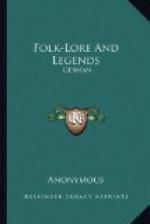“A party o’ Highlanders were busily engaged, ae day in harvest, in cutting down the corn o’ that field; an’ just aboot noon, when the sun shone brightest an’ they were busiest in the work, they heard a voice frae the river exclaim:—’The hour but not the man has come.’ Sure enough, on looking round, there was the kelpie stan’in’ in what they ca’ a fause ford, just fornent the auld kirk. There is a deep black pool baith aboon an’ below, but i’ the ford there’s a bonny ripple, that shows, as ane might think, but little depth o’ water; an’ just i’ the middle o’ that, in a place where a horse might swim, stood the kelpie. An’ it again repeated its words:—’The hour but not the man has come,’ an’ then flashing through the water like a drake, it disappeared in the lower pool. When the folk stood wondering what the creature might mean, they saw a man on horseback come spurring down the hill in hot haste, making straight for the fause ford. They could then understand her words at ance; an’ four o’ the stoutest o’ them sprang oot frae amang the corn to warn him o’ his danger, an’ keep him back. An’ sae they tauld him what they had seen an’ heard, an’ urged him either to turn back an’ tak’ anither road, or stay for an hour or sae where he was. But he just wadna hear them, for he was baith unbelieving an’ in haste, an’ wauld hae taen the ford for a’ they could say, hadna the Highlanders, determined on saving him whether he would or no, gathered round him an’ pulled him frae his horse, an’ then, to mak’ sure o’ him, locked him up in the auld kirk. Weel, when the hour had gone by—the fatal hour o’ the kelpie—they flung open the door, an’ cried to him that he might noo




